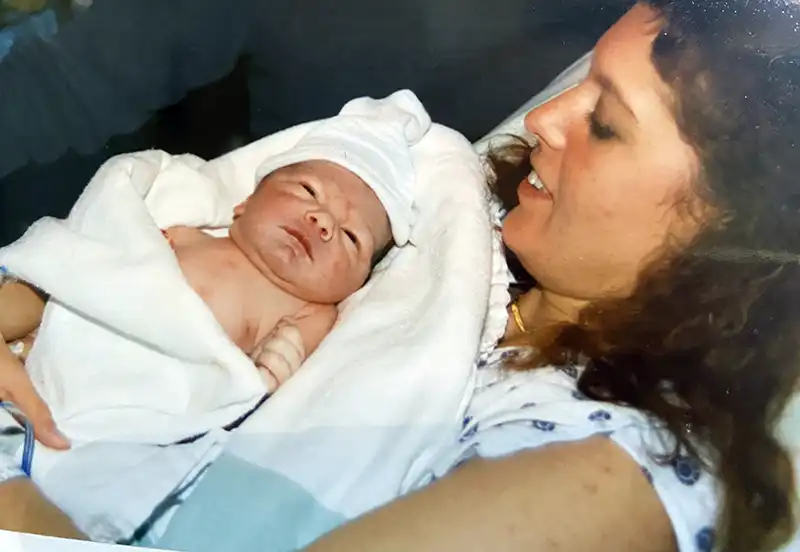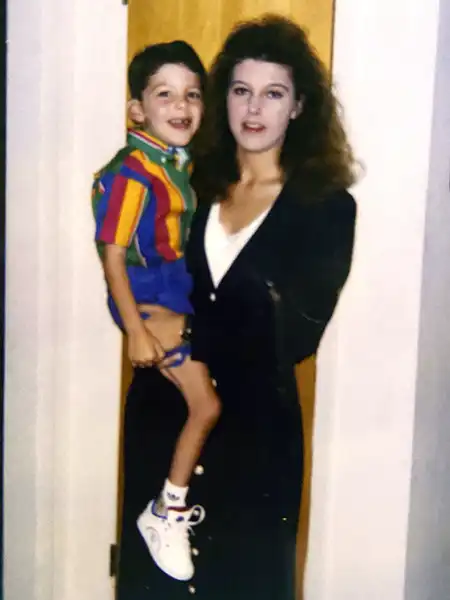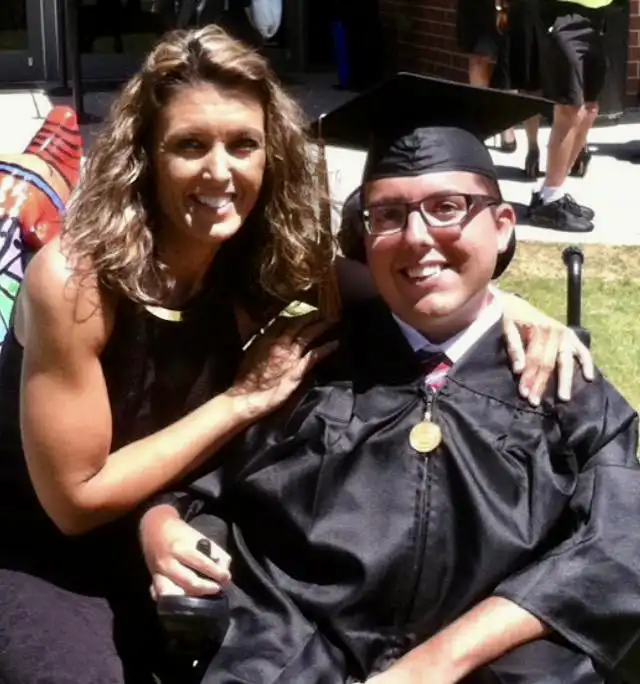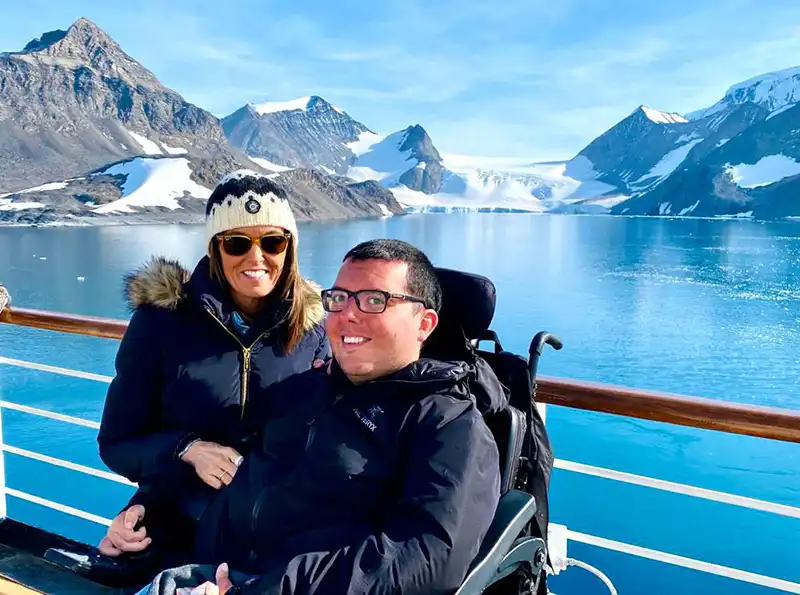Growing up, I watched as my mother struggled to care for my grandmother, who suffered from a crippling form of rheumatoid arthritis. I was only a bystander at the time, but I learned at an early age that caregiving looks tough but it's something we do when we love someone. I saw that we should want to help them and we should want to give them a life that is both of good quality and filled with happiness. But when my grandmother passed away, I had no idea and never dreamed that the lessons I learned about dressing, bathing, and caring for another person would mold me into the mother that I was soon to become.

At only 20 years old, I gave birth to a nine pound, bouncing baby boy. I was overjoyed and I dreamed of the day when he would be a star athlete or an astronaut. I could see his future and the sky was the limit. But then, at the age of one and a half, my son Cory was still struggling to walk. He was only taking three or four steps and his knees would buckle. His head would hit the floor far quicker than I could jump over to keep him from falling. My heart broke for him as I watched him cry and I felt the pain in each of his tears that streamed from his big brown eyes and ran down those pudgy little red cheeks.
After several doctor visits, I was feeling frustrated. They tried to convince me that I was an overprotective mother and that I was overreacting. They said that he would eventually "get the hang of it," and would be running around everywhere. I hoped for nothing more than this, but still felt in my heart that something was wrong. Finally, when he turned two, a doctor agreed to complete a muscle biopsy on him to just to rule out any muscular abnormalities. I was both relieved and exhausted in my search to find some answers to all of Cory's falls.
I will never forget the feeling that I felt when the results of the biopsy finally came in. I was both nervous and anxious to hear what the doctor had to say. As I walked into the doctor's office, a young boy in a wheelchair was rolling out. A knot came into the pit of my stomach as I watched the brown-haired, handsome young boy being pushed out the door by a lady who gave me a comforting smile with her hair tossed around, no makeup on, and wrinkles throughout the her skirt. She looked tired but pleasant, I thought, as I watched them leave the room. That's when my name was called and the doctor asked me to come into his office.
His large, wooden desk was a bit intimidating and I felt so small as I sat there awaiting the results of my precious son's biopsy. As the doctor began to talk, I could hear the words coming out of his mouth but my mind began to wander. Would he ever be able to walk? Would he ever be able to run? What would life be like if he ends up in a wheelchair like the boy who just left? But the doctor continued to discuss the results and as I came back to my senses, I heard him saying that Cory has Spinal Muscular Atrophy Type II. he said that it is a disorder that affects the motor neurons that control voluntary muscle movement and because the muscles cannot respond to signals from the nerves, they atrophy, weakening and shrinking over time from inactivity. This is news that no mother wants to hear about her perfect baby. I wondered what life would be like for him, or for me for that matter. I felt that all my hopes and dreams for him were crushed in that moment and I wasn't even sure how to move forward.
Cory never walked more than about six to eight steps without collapsing. I would stand behind him, holding his hands and taking steps with him to make sure that he didn't fall. I remember thinking some days that my back would give out from being bent over with each of his steps. I rigorously took him to physical therapy, occupational therapy, and pool therapy to make sure that I was doing everything that I could to keep him as active as possible. I carried him everywhere that we went until he got his first wheelchair at the age of four. He was able to roll it himself then, but I would have to assist him with standing up and getting in it, ensuring that he didn't fall between the bed and the wheelchair.

Being young myself, I didn't know how the world would react to him being in a wheelchair, but I knew that I wanted his life to be as "normal" as possible. I made sure that he was always dressed nice, that he was bathed & clean, and that there was no reason that someone would see him as any different than them other than the fact that he couldn't walk. My life seemed to be different than other young mothers', though. I was always the one that was at the kids' table at mealtime, and in the playroom with him and his cousins while the grownups were in the living room, as I knew that he needed help to reach for things. His wheelchair would often prevent him from being able to play with the other kids as they would be down on the floor or sitting on the bed while he was left sitting in his chair. I made it my goal to make sure that he didn't regret being in a wheelchair. I was there for him to assist with transfers and to make sure that he was included just like everyone else. It was tiresome, but just like I had been taught: when you love someone, you do what is needed.
As the years passed, my son was the highlight of my days. He was an "A" student, always happy & smiling, and he loved living life. He was to go everywhere, do everything, and never let anything hold him back. His physical needs became greater as he was losing strength in his hands & arms, and he was growing taller & heavier. By second grade, he could no longer stand. He relied on me for full assistance with picking him up and putting him to bed, in his wheelchair, or any other spot he wanted to be. His needs at school were the same as well, as he needed assistance for toileting, getting his books out, and carrying his lunch tray. His teacher just couldn't be there for him 100% of the time, so after several IEP and 504 meetings, the school decided to hire a paraprofessional that would work one-on-one with him just for his physical needs. She went from class to class with him, to lunch, assisted with toileting, and provided the physical care that he needed to get the regular education that he deserved. He graduated high school as an honor graduate with this same aide by his side, and had recently received eight college scholarships. This came from years of hard work and determination.
I had also worked as a paraprofessional in the same school system from the time he was in second grade until he graduated. I wanted to have the same school hours as him at my job and decided that this was the best way to do it. Not only could I be there if needed, but I could also drive him to school and take him home from school, as the school system refused to allow him to ride the bus unless he was labeled as a "special education" student. I fought it for all of his elementary years as I argued that he did not require a "special" education; he required an "adapted" desk, assistance with his lunch tray, help if he dropped his pencil, and someone to help with toileting. All of this is to say that I never gave in and he never gave up, graduating at the top of his class.

Being a good caregiver is more than just handing them a tissue or putting a straw in their drink. A good caregiver cares about their loved one and cares if they are comfortable and happy and if they have a desire to live a fulfilling life. Cory moved away from home for college, and those were the toughest "caregiving" years of my life. I wanted to be there to make sure he was okay, but I had to put that trust into the hands of someone who was hired through an agency. I had to give him time to grow as an adult, and trust that he would make good decisions on his own. Things went well, and my phone never left my side throughout his entire college career. My friends and family told me I was crazy for allowing him to move off to school, as he was in a wheelchair and it would be "too difficult" for him. But Cory worked so hard all of his life and dreamed of nothing more than graduating college, and he did it! He graduated with a Bachelor of Business Administration in Marketing degree. I could not have been more proud, and you can bet your bottom dollar that I was right there on graduation day, sitting in the front row, smiling with pride from ear to ear.
After college, Cory was having a difficult time finding a job and had moved back home with me. I didn't mind at all, but I could see his mood and mindset was falling into a depressive state. He had worked so hard to have a career, only to now have mom cooking and cleaning, dressing and bathing him, and then for it all to only start over again the next day. But then, after searching for some information online about accessibility in Australia for a trip that he and I were planning, he found no information about if wheelchairs could even get around there. Nothing was online about available accessible taxis, and he noticed that the hotels did not state if they had accessible rooms or if the city had any fun things to do for someone using a wheelchair. He knew that he had to make a change. And that is the day that his accessible travel blog Curb Free with Cory Lee was born. I fully supported him and told him he should start writing about our past trips and explain what we did or couldn't do in each destination. I helped with setting up his computer so that he could reach it and type, and I dug out old photos from our attic so that he could include them in his blog posts.
As his readership grew, destinations began to reach out to him, asking us to come and see how accessible their cities were so that he could include them in his next blog posts. I knew that this would take some work on my part as I would need to ask off work, pack all the clothes, drag all the suitcases, and make sure that he was physically taken care of by getting in the hotel bed, into the showers, and in & out of taxis, planes, trains, trams, and whatever life threw at us. But again, we didn't give in to our weaknesses; we pushed forward. We've now toured over 40 countries together and all seven continents, and for that I am thankful and feel totally blessed.

I don't mean to say that it has been an easy road. But it has absolutely been worth it, and I have never been so proud of all he has accomplished as I am today. Caregiving anywhere is tough, but it's even harder on the road. Sometimes the hotel beds are too high or too low, but at least Cory has the C-Me elevation feature on his wheelchair. This gives him the ability to raise his chair higher or lower, adjusting to the height of the bed, saving my back! The shower may have a step to get inside it, or the bus driver may drive too fast and I have to stand beside Cory and hold his head upright to keep him from getting tossed around.
Most nights, I am exhausted from just trying to make sure he has had an easier day. Sometimes I have to drive us home from the airport in the middle of the night, even though we've been flying all day and I'm sleepy and so tired, only to still have to assist him with his breathing treatments and get him safely tucked into bed once we are home. But I am a caregiver and that is what is needed. I never fully rest, as I am constantly making sure that his needs are met. I always think of caring for him in a way that I think, "What would I want?" or "Would my leg go to sleep if it hasn't moved in two hours?" and so I assist him. A true caregiver gives care not just when it is convenient for them, but when it is needed.
Even though I give my best to care for him, I must also take care of myself. This is where the tricky part comes into play. How can I be so exhausted and still be healthy? This is why a lot of caregivers burn out and become disgruntled. It is important to take time for yourself. After reading how time-consuming giving care can be, how can you find time to care for yourself? The struggle is real, but the importance of proper sleep and exercise is of utmost importance. Even if the exercise is minimal, it is important. I have been doing 200 crunches before bed for the last 25 years. It only takes a few minutes, but I did have to build up to it in sets of 25 in the beginning. It is just a small way to keep my core strong so that I can more easily care for Cory. I also do 50 squats while brushing my teeth and I do leg kicks and body dips off the couch while watching TV. I have found where there's a will, there's a way to make time for what is important to you. I figure if I can't take care of me, how can I take care of him?
Caregiving can sometimes come with struggles. It is a give-and-take between the person needing care and the one providing care. Respect between the two is needed for the relationship to work and for both people to get what they need. Caregivers love feeling appreciated as anyone would, and hearing "thank you" and "I appreciate you helping me" are words that can make a caregiver's day. And asking the one needing care if there is anything else that they need, or asking if they are comfortable can bring their mood for the day to new heights. I do believe that Cory and I have found that happy balance and I can't imagine my life any other way. Thinking back to that young 20-year-old girl what I once was when I gave birth, to the confident, caregiving mother of a world traveler that I am today, has truly made my life complete. Because of the challenges that we face daily, I am driven to do better, be better, and give without hesitation. That's a feeling that puts a smile on my face and a warm fuzzy feeling in my heart.
About the author
Sandy Gilbreath is a world traveler, social media influencer, and a Georgia native. She is a single mother to the award-winning travel blogger Cory of Curb Free with Cory Lee. She is the co-author of the children's book "Let's Explore with Cor-Cor" and serves on the Board of The Curb Free Foundation, a non-profit organization that awards travel grants to people who use wheelchairs. Follow her travels on her Facebook page, My Sandy Trail.
Most of the stories here on LiveQuickie.com were submitted by readers. Do you have a story to tell? We'd love to hear it. Submit your story here.